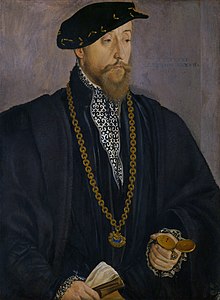Pankraz von Freyberg zu Hohenaschau

Pankraz von Freyberg zu Hohenaschau (* 1508 at Hohenaschau Castle ; † December 24, 1565 ibid) was a Bavarian entrepreneur , politician ; he was inclined to the Reformation.
Family background and early life
Pankraz von Freyberg zu Hohenaschau came from the Freyberg family . He had two younger brothers. His mother Helena , née von Münichau, was also of wealthy origin; she was a supporter of the radical Reformation Anabaptists . As a young man, Pankraz took part in the Emperor Charles V's wars against France under Georg von Frundsberg . In 1530, when Pankraz returned to Hohenaschau , his mother had to flee from Wilhelm IV , who advocated Catholicism and took strict action against dissenters.
His father's property was transferred to him in 1535. From 1536 he was given the right to wear the von Aschau coat of arms in addition to the Freyberg coat of arms for his services to the emperor . In 1538 Pankraz von Freyberg married Maria Kitzscher von Elkofen ; with her he had five sons and two daughters. After his appointment to the ducal court, Pankraz's wife took over the administration of Hohenaschau from 1550. Pankraz was able to acquire Wildenwart Castle from the inheritance of his mother, who died in 1540 . Because of his refusal to pay his brother's debts, Pankraz was briefly detained in 1544.
After the provost von Herrenchiemsee had claimed that he adhered to the Lutheran doctrine , Pankraz sought a case of defamation, which he won. It is not known whether Pankraz had openly shown himself to be a supporter of the Reformation ; the background for the claims may have been the mother's reputation in matters of faith.
Mining and metallurgical contractors
As an entrepreneur in mining and metallurgy , Pankraz was significant for the early industrial development in the Chiemgau , which until then had been characterized by agriculture. In 1546 he received mining rights on the Kampenwand . After he had also acquired a brewery in 1549 , he bought the concessions for the ore mines at Kressenberg near Teisendorf in 1552 . He built a hut with a hammer mill in Aschau and in Hammerau .
Political career
As early as 1538 he had participated in state parliaments . From 1544 to 1548 he was a nurse in Aibling . In 1550 Duke Albrecht V appointed him to his court in Munich as a Privy Councilor . In 1553 he rose to court marshal and thus to the highest administrative officer. Pankraz was also in command of the war team and the supervision of the armory. The offices of his possessions in Hohenaschau and Wildenwart were also located in the Pankraz house in Munich.
Together with other Lutheran members of the estates , Pankraz von Freyberg stood up with Albrecht V for freedom in matters of religion. In exchange for giving in on tax issues, concessions could be wrested from Albrecht. In 1555, for example, he sent a messenger to Rome to promote the release of the laity's chalice at the Council of Trent . From 1556, lay goblets, priestly marriage and breaking the rules of fasting were exempt from punishment in Bavaria, albeit forbidden.
The first disputes with Duke Albrecht occurred in 1558 when he asked for the Lord's Supper in both forms - bread and wine - at the Easter mass in the Fürstenfeld monastery near Munich, but did not receive it. After the Catholic party at court had gained strength, rumors arose that Pankraz had betrayed official secrets and was seeking imperial immediacy for his possessions. In 1561 he asked for an honorary resignation and was dismissed by Duke Albrecht. From then on he devoted himself to writing theological writings.
After the state parliament in Ingolstadt demanded the release of the Augsburg Confession in 1563 and the conflict between the evangelical nobles and the duke escalated, Pankraz von Freyberg was joined by Joachim von Ortenburg and Wolf Dietrich von Maxlrain , with whom he had been in close correspondence , suspected of conspiracy and charged in June 1564. Only the charge of insulting the Duke could be upheld in the process. Despite an apology, he was arrested, partly for refusing to reveal who had notified him of the upcoming trial. After two months in the Munich Falcon Tower , he was released, excluded from the state parliament and exiled to his estates, where he died a year later.
literature
- Peter von Bomhard: Freyberg, Pankraz von. In: New German Biography (NDB). Volume 5, Duncker & Humblot, Berlin 1961, ISBN 3-428-00186-9 , p. 422 ( digitized version ).
- Dieter Schäfer : Rise, fall and fame of the Pankraz von Freyberg . Ecora, Prien am Chiemsee 1996, ISBN 3-923437-15-3 .
| personal data | |
|---|---|
| SURNAME | Freyberg zu Hohenaschau, Pankraz von |
| BRIEF DESCRIPTION | German politician |
| DATE OF BIRTH | 1508 |
| PLACE OF BIRTH | Hohenaschau Castle |
| DATE OF DEATH | December 24, 1565 |
| Place of death | Hohenaschau Castle |
